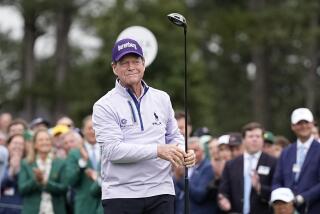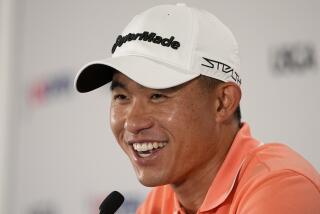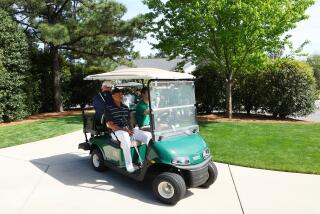For Watson’s Caddie, It’s Still Elementary
- Share via
OLYMPIA FIELDS, Ill — OLYMPIA FIELDS, Ill. -- Bruce Edwards was back at work Friday at the U.S. Open, walking alongside Tom Watson on the neatly manicured grass of Olympia Fields Country Club.
Edwards could have used a cart because Watson lined one up for him with approval from the USGA, but Edwards said he preferred to use his feet, the traditional method of transportation for caddies.
The caddie with the tanned face says his legs are still good and that he’d rather walk with Watson anyway.
The caddie with the tanned face and wide grin says the U.S. Open isn’t a place for carts, like a Champions Tour event.
The caddie with the tanned face, wide grin and amyotrophic lateral sclerosis says he’s saving his powers of concentration for a big weekend for Watson, a couple of rounds in the 60s.
Edwards says that what they’re trying to do, the 48-year-old caddie and the 53-year-old superstar, is to come up with something special.
“We’re trying to create one more memory,” he said.
Watson wasn’t as sharp as he was in the first round, when he shot a 65 and tied for the lead in his 30th U.S. Open. But the way Edwards looked at it, Friday’s two-over 72 meant Watson was still in the hunt. Remember, Watson knows how to win this tournament, Edwards said.
The caddie is comfortable talking, but when he does, he slurs his words. That’s consistent with one of the first stages of his illness.
It’s been nearly five months since Edwards learned he had ALS, known as Lou Gehrig’s disease, a progressive illness that attacks nerve cells in the brain and the spinal cord. Eventually, those afflicted with ALS lose the ability to control their muscles. In the later stages of the disease, they become paralyzed. But for the vast majority, their minds remain unaffected.
The average life expectancy of someone with ALS is from two to five years after they are diagnosed with the illness, but statistics show that 5% live 20 years. On rare occasions, the symptoms are reversed.
Besides Watson’s bag, this is what Edwards is carrying with him at the U.S. Open.
At an awards dinner in Augusta, Ga., before the Masters, Edwards and Watson were on hand as pro golfer Jeff Julian was honored for his courage. Julian has ALS and uses a mechanical voice box to speak.
Edwards has lost 20 pounds since January, when Watson urged him to get examined after Edwards noticed some numbness in his hands. Watson has donated $200,000 to help out, establishing the Bruce Edwards Foundation.
Other than being a little lighter and slurring his words, Edwards says he’s doing all right.
He feels good about contributing to Watson’s success the first two rounds and looks forward to the next two. Making the cut was a goal they established before the tournament, but now the objective has changed.
“The objective is to work our way up the leaderboard,” Edwards said. “I’m a firm believer, a couple of rounds in the 60s and we’re right there. It’s not about making the cut anymore.”
That’s nothing new, Edwards said, “We’ve made it through a lot of weekends in the past.”
The plan of action is also the old one. Just go out there and try to win a golf tournament. Edwards says his presence here with Watson is about golf, not about making a statement on how to conduct yourself when you’re staring at an illness for which there is no cure.
There is hope, however. Even if it’s not his intention to send a message, he says it’s not a bad idea if someone wants to take notice of him this week.
“I would like people to get off their butts and keep living life,” Edwards said.
Sure, he has had a bad break, but here he is, working at the U.S. Open, still going despite being sick.
“People say you can’t will it away,” he said. “I think you can.”
He said there are two ways to deal with having something like ALS.
“It’s pretty simple,” Edwards said. “You can decide you want to feel sorry for yourself or you decide to live each day and carry on.”
Edwards has already chosen his path: “I’m going to keep on going.”
Maybe others will notice his attitude. Maybe, Edwards said, he can make a difference.
He already has.
More to Read
Go beyond the scoreboard
Get the latest on L.A.'s teams in the daily Sports Report newsletter.
You may occasionally receive promotional content from the Los Angeles Times.










